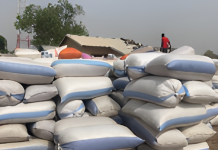By Mustapha Jallow
The situation in Kanilai as of Tuesday 6 June remains calm and life appears to be returning to normal. People are going about their businesses, students going to school and vehicles are moving up and down.
Security forces abound but they look relaxed and are communicating to the people.
The Alkalo, Ebrima Jammeh, alias Ebou Jammeh, keeps advising the people to avoid violence and be calm. He however told Foroyaa that the commander of the soldiers at Kanilai came to his home and informed him that all residents of Kanilai must be in their homes by 10 pm. He added that he had already moved from house to house informing them what he had been told by the commander.
He called on the people of Kanilai to accept the rule of President Barrow. He however added that he is not comfortable with the troops stationed at Kanilai.
He pointed out that they are suffering, saying that ex-president Jammeh used to give them sugar, oil and rice in the month of Ramadan. He also said that electricity and water are of great concern to them.
He explained that they are ready to engage in dialogue and work with the government. He prayed for peace.
He explained that many youths ran away into the bush fleeing arrest and are yet to return, which he said is of great concern to them.
The Alkalo also said that women gardeners need support from the government and will appreciate help from them.
In response to claims that residents of Kanilai have been asked to stay at home after 10 pm the GAF spokesperson Lieutenant Colonel Omar B. Bojang disclosed that they deployed soldiers on the ground for security reasons as well as protecting the village people. He said that there is no curfew but “movement limitation” as Kanilai is somehow a dark village and there is the Gambia/Casamance (Senegal) border and it is not safe to leave it without security there. As for security advice, the military commander at Kanilai was instructed to go and inform the Alkola to tell his people to limit their movement; that they can be in their homes while chatting but not on the streets.




















